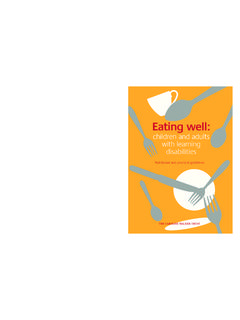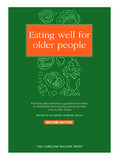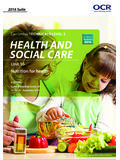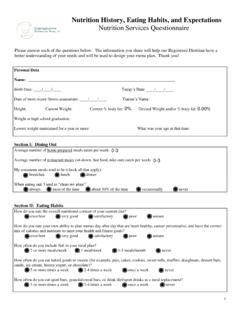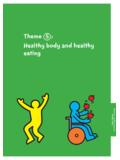Transcription of Eating well: supporting older people and older people with ...
1 Eating well :supportingolder peopleand olderpeople withdementiaPractical guideHelen Crawley and Erica Hocking THE CAROLINE WALKER TRUSTE ating well :supportingolder peopleand olderpeople withdementiaPractical guideHelen Crawley and Erica Hocking THE CAROLINE WALKER TRUSTP ublished by The Caroline Walker Trust, 978-1-89-782039-1: Book and CD-ROMThe Caroline Walker Trust22 Kindersley WayAbbots LangleyHerts WD5 : charity number: 328580 The text of this guide, and the photos, can bereproduced for personal use or for use intraining related to Eating well for older adultsand older adults with dementia, provided anacknowledgement is made to The CarolineWalker Trust. This guide is provided for information only andindividual advice on diet and health shouldalways be sought from appropriate Caroline Walker Trust would like tothank the Nuffield Foundation for fundingthe production of this guide.
2 The Nuffield Foundation is an endowedcharitable trust that aims to improve socialwell-being in the widest sense. It fundsresearch and innovation in education and socialpolicy and also works to build capacity ineducation, science and social science Nuffield Foundation has funded thisproject, but the views expressed are those ofthe authors and not necessarily those of theFoundation. More information is available Particular thanks for their help in reviewing thisguide and the accompanying CD-ROM are dueto Gwendoline Coleman, Diana Hawdon, SueHawkins, Rose Magowan and Alison by Wordworks, London W4 by Sally Caroline Walker TrustThe Caroline Walker Trust is a charity whichaims to improve public health through goodfood. For more information about The CarolineWalker Trust and how to obtain any of ourpublications, see our website publications by The Caroline WalkerTrustFor details see well for Under-5s in Child CareEating well at SchoolEating well for Looked After Children andYoung PeopleEating well : Children and Adults with LearningDisabilitiesEating well for older PeopleEating well for older people with Dementia.
3 (Published by VOICES. Now out of print butavailable to download from the CWT )Training materialsEating well for Under-5s in Child Care Training MaterialsEating well : supporting Adults with LearningDisabilities Training MaterialsFood photo resourcesFor food photo resources and practical guidesfor Eating well for children and young people ,see the CHEW resources at ContentsIntroduction5 Who is this guide for?5 The aim of this guide5 Why Eating well matters for older people and older people with dementia 6 What Eating well means6 Why are some older people and older people with dementia at nutritional risk?6 What happens if an older person becomes under-nourished?8 Managing underweight and overweight10 Other common health problems among older people15 Medicines and their impact on nutritional status 19 Helping older people with learning disabilities to eat well 20 Helping older people with dementia to eat well20 Maintaining independence in Eating 21 Helping someone to eat21 Managing other Eating and drinking difficulties24 Planning meals and snacks for older people28 Texture of food28 Eating patterns28 Planning meals and snacks29 Sustainability29 Cost30 Special diets 30 Food safety and good hygiene33 Portion sizes34 Encouraging Eating well34 Example meals and snacks for older people35 Meals and snacks (normal texture)
4 37 Example one-week menu normal texture 39 Food photos42 Finger foods49 Preparing finger foods50 Drinks52 Nutrients in finger food diets52 Finger food meal and snack ideas53 Example one-week menu finger foods54 Food photos57 Soft-textured foods63 Preparing soft-textured foods64 Drinks66 Nutrients in soft-textured diets66 Soft-textured meal and snack ideas67 Example one-week menu soft-textured foods68 Food photos71 Pur ed (smooth) foods77 Preparing pur ed meals and snacks78 Drinks81 Nutrients in pur ed diets82 Food supplement drinks82 Using baby foods in pur ed diets83 Pur ed meal and snack ideas85 Example one-week menu pur ed foods86 Food photos89 Adapting meals for all to enjoy95 Adapting menus and meals for different textured diets 96 Adapting meals for different textured diets 97 Adapting a daily menu for older people who have different textured diets100 For more information105 General food-based guidance to help with food and drink choice106 Good sources of nutrients 112 Organisations 115 Useful resources 117 Index121 Eating well : supporting older people and older people with dementiaISBN 978-1-89-782039-1: Book and CD-ROMP roduced by THE CAROLINE WALKER TRUSTFor information on how to use this CD-ROM, see Eating well .
5 supporting OlderPeople and older people withDementia: Practical CD-ROM at the back of this guide contains: a PDF of this guide photos of example meals and snacks, and suggested portion sizes and recipes for the dishes shown in the photos. 5 IntroductionThe aim of this practical guide is to support all those who help older peopleand older people with dementia to eat well . It provides practical guidanceabout the sorts of food and drinks that can be served to ensurethat everyone has healthy, nutritious and enjoyable meals, snacksand drinks. The information in this resource is based onrecommendations and guidance in the reports Eating well for older Peopleand Eating well for older people with Dementia. Both of these reports are available to download free of chargefrom the Caroline Walker Trust website is this guide for?This resource is for all those who work with and support older people and olderpeople with dementia.
6 This may be as a carer, supporter, advocate, familymember or friend, health professional or manager in any setting where olderadults and older adults with dementia live, work or socialise. The aim of this guideThe materials aim to provide simple guidance on what Eating well really means,and to offer help and advice where there may be particular difficulties aroundeating, drinking or accessing practical guide provides information on: why Eating well matters for older people and older people with dementia the key things to consider when helping older people to eat well how to support those who may have difficulties Eating menu planning ideas for how to provide food which meets the nutritionalrequirements of older people how to ensure that nutritional needs are met when the texture of meals needsto be changed for example, for soft-textured or pur ed food.
7 This guide also includes photos of example meals and snacks to show the sorts offoods and amounts of foods that meet the needs of older people . The photos andrecipes for these dishes, and a PDF of this book, can be found on the CD-ROMwhich accompanies this and nutritional guidelines for food in residential and nursing homes and forcommunity mealsREPORT OF AN EXPERT WORKING GROUPTHECAROLINEWALKERTRUSTE ating well forolder peopleSECOND EDITIONI ntroduction6 What Eating well meansEating well means that someone has the amount of energy (calories) andnutrients (protein, fats, carbohydrates, fibre, vitamins and minerals) that they needevery day to maintain their body processes and to protect their body from illhealth. There is significant evidence that poor diet is related to illness and topremature death as well as to many health conditions which can lower the qualityof life for older people .
8 In order to eat well , people need to have a variety ofdifferent foods every day and, while it is not complicated to achieve this, there canbe challenges when people get older to ensure that they eat enough food that isappropriate to their are some older people and older peoplewith dementia at nutritional risk? older people need to eat well as they have a greater risk of becoming under-nourished and this can have an impact on their health, well -being and quality oflife. older people and older people with dementia have at least the samerequirements for good nutrition as everyone else in the population, but they mayfind it more difficult to access a healthy diet for a number of reasons: older people may have a small appetite and eat too little food. This may be becausethey are less mobile or less active or may be due to an underlying illness. older people may live with a chronic disease which impacts on their day-to-day livingand their ability to access and eat a good diet.
9 Some older people will have increased needs for energy and nutrients for example,if they have recently had an illness or been in hospital for surgery, or if they havewounds that need to heal, such as pressure sores or leg ulcers. Mouth, chewing and swallowing problems become more common and can have animpact on food choice. Some medicines may have side effects which play a part in appetite changes,abnormal Eating behaviour or Eating disorders. Poor sight, hearing, taste or smell may reduce enjoyment at mealtimes. Difficulties shopping for and cooking food can lead to fewer fresh foods being eatenfor example, and can lead to diets of less variety that are low in essential nutrients. Concerns about paying for fuel to keep warm can mean that some older people areworried about spending money on food and may eat inappropriately. Poorer communication skills (for example, because of difficulties hearing or speaking,or because of dementia) may mean that older people cannot explain what foods anddrinks they like, or may be unable to explain that the temperature of food is wrongor that the portion sizes are too large or too Eating well matters for olderpeople and older people with dementiaWhy Eating well matters for older people and older people with dementiaOur bodies change as we get older : A less efficient immune systemmeans that older people and older peoplewith dementia are more prone to illness and infection.
10 As we age, our digestive system works more slowly, so constipation andbowel problems are more common. As we age, we lose muscle and bone strength, making it more likely that wewill fall over and fracture bones. Less efficient kidneysmean that urine is less concentrated, people may beless likely to realise they are thirsty, and dehydration is more older people may lack good support to eat well : Some older people may not have anyone to help them buy and cookthe rightsorts of foods or to encourage them to eat and drink regularly. Some people might need specialist Eating and drinking toolsto help atmealtimes and some might need assistance with Eating and drinking itself. Some carers might not realise how important it is to check that older peopleare Eating well and might not know how they can support and encourageolder people to have the sorts of foods and amounts of foods that they people with dementia may have particular problems in Eating well : people who are confusedmay miss meals or forget to eat.
